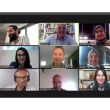Embracing the opportunities of e-Government
“This program matches perfectly my organisation's needs and addresses the challenges it faces in its quest for the modernisation of our tax administration.” Celia Mokrani (Algeria) participant of the executive e-Government program which took place from 31 May – 4 June 2021.
e-Government, evolving into Digital Government, is one of the most challenging and promising public sector issues of today. It is much more than moving interactions to digital platforms or providing government services over the internet. It stands for technology enabled opportunities for sustainable development. Joris Stadhouders, Assistant Professor of Management Information Systems at MSM, designed the MSM e-Government program as for its participants to develop a thorough understanding of the potential of e-Government, its required legal and institutional frameworks, its possible policies and projects, with the final aim to provide participants with the handles to contribute to an engaging e-Government in their home countries.
Joris Stadhouders introduced the participants to various frameworks analysing ICT in and around organizations and explained how strategy, structure, process, roles, ICT management and the culture of an organization play a role in the context of service delivery. The participants analysed and discussed articles and cases studies about the failures and successes of e-Government projects and systems in the context of development.
International expert Dr. Morten Meyerhoff Nielsen was the lead trainer in this program. He introduced eGovernance with approaches to ICT and policy and evaluated approaches to online service delivery and usability. In addition, the participants explored initiatives compared to current “best practices and standards”, and analysed policies and issues facing government and agencies in developing online services. Furthermore, they discussed the security issues, laws and regulations impacting the development of online services. Case examples from different counties were presented. They closed of with a discussion on how to create an ecosystem and framework for digital public sector service delivery and how Digital Government can help overcome Red Tape.
The participants finalized the course with a back home action plan, in which they applied the different lessons learned throughout the program.
According to Celia Mokrani (Algeria) the programs matches perfectly with the needs of her organization: “This training covers interesting topics such as digitisation strategies of public administration, analysis and evaluation of e-Government projects. I am confident it will help me strengthen my skills in this field. The know-how I acquired will also enable me to understand different aspects of e-government and thus support me in designing a pragmatic and adapted response to my Directorate's issues.” Also Sofia Dekri (Morocco) is very positive about the program: “e-Government is becoming a popular focus of the Moroccan government effort. I hope that I can participate on those efforts using concepts and models acquired during the course.”
The participants appreciated the combination of theory and practice, as well as the range of topics and variety of experts: “The program bridges theory and practice which made the modules easier to understand. The lecturers are all devoted and passionate about the topics they're teaching and eager to share their experiences with us. They explained each concept in a detailed and accurate way, what allowed us to absorb all the information that was shared.” said Celia Mokrani.
About MSM’s executive education programs
In today’s rapidly changing world, it is important for leaders and professionals to keep their knowledge and skills up to date and relevant. Investing in executive education is investing in your future. At MSM, we embrace this lifelong learning approach! MSM’s hands-on executive programs, led by thought leaders and business experts, provide a practical and action-oriented learning experience and are designed to have an immediate impact on performance.
Related news
Mastering the challenge of financing and managing development projects
Key ingredients for a successful organizational change
Strategic Leadership – Setting the direction for successful and sustainable growth

